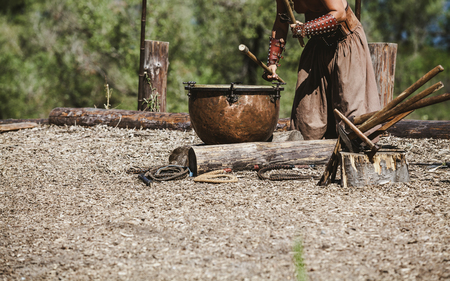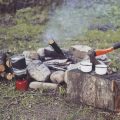Introduction to British One-Pot Camping
If you’ve ever pitched a tent in the wilds of Dartmoor or brewed up a cuppa beside a misty Scottish loch, you’ll know that food tastes best outdoors—especially when it’s proper British fare. The allure of cooking traditional British meals in a single pot isn’t just about convenience; it’s rooted deep in the hardy spirit of UK camping culture. In a land where weather can shift from drizzle to downpour in minutes and the terrain demands resilience, one-pot recipes are more than a clever trick—they’re survival wisdom handed down through generations.
Why do these all-in-one wonders suit British campers so well? For starters, they let you pack light and move fast—a single pot means less kit to lug over rocky fells or sandy beaches. But it’s more than that: a bubbling stew or hearty casserole brings comfort after a sodden hike or windswept day on the coast. These recipes echo the flavours of home—think rich beef and ale stew, rustic hotpots, or savoury vegetable broths—all designed to warm the bones and lift spirits no matter how bleak the forecast.
In classic British outdoor culture, meals around the campfire aren’t just sustenance—they’re tradition. From Scout groups learning their first ‘cowboy stew’ to seasoned wild campers perfecting their game pie, one-pot cooking connects us to a sense of place and history. It’s about resourcefulness, adaptability, and making do with what you’ve got—values at the heart of both British cuisine and outdoor adventure. This guide will walk you through mastering these dishes, ensuring that wherever your boots take you across Britain’s rugged landscapes, you’ll never go hungry—or lose that taste of tradition.
Essential Gear and Preparation Tips
If you’re aiming to master British one-pot camping recipes, then preparation is every bit as vital as your cooking skills. When the Lake District winds bite or a Cornish drizzle sets in, having robust kit and a solid prep routine can mean the difference between a hearty stew and a soggy disappointment. This section is your no-nonsense field manual for gearing up and getting organised.
British Camping Cookware: The Essentials
Forget flimsy supermarket pans—invest in sturdy, time-tested gear designed for real-world British conditions. Here’s what should be at the heart of every proper camp kitchen:
| Gear | Why You Need It |
|---|---|
| Cast Iron Dutch Oven | Retains heat brilliantly, cooks evenly, and stands up to open flames or coals—perfect for stews and casseroles. |
| Enamelled Billy Can | Lightweight but durable, ideal for boiling water or preparing porridge in the morning mist. |
| Folding Grill Rack | Gives you options: toast bread, grill bacon, or use as a stable base over embers. |
| Long-handled Wooden Spoon | Tough enough to stir thick potages without burning your hand on hot metal handles. |
| Locking Tongs | Essential for safe handling of hot lids or moving meat around the pan without fuss. |
| Heavy-duty Knife & Chopping Board | No-nonsense tools for prepping veg or carving hunks of meat, rain or shine. |
Must-Have Utensils for British One-Pot Cooking
The right utensils keep you efficient and authentic. Don’t overload your rucksack—focus on versatility and durability. A tin mug doubles as both cup and ladle; an army-style can opener is worth its weight if you’re opening tins of beans or treacle pudding. Bring a compact washing-up brush to make short work of cleaning up, even if water’s scarce.
Preparation: Stay Ahead of the Weather
The best camp cooks are always one step ahead of Britain’s famously fickle weather. Here are battle-tested tips:
- Pre-chop Ingredients: Dice onions, carrots, and potatoes at home; store them in airtight bags to save time and reduce faff at camp.
- Marinate Meats Beforehand: Let flavours develop overnight in sealed containers – less mess on site, more flavour in your pot.
- Pack Dry Mixes: Combine flour, herbs, and spices into small bags; perfect for dumplings or thickening stews without hauling your whole larder along.
- Clever Storage: Use stackable tubs to keep everything watertight—nothing worse than soggy teabags after a downpour.
- Shelter Your Cooking Area: Bring a windbreak or tarp; nothing slows you down like battling gusts when you’re trying to get dinner sorted before dark.
Tough Techniques for Authentic Results
Bake bread rolls in the Dutch oven by burying it in embers; simmer broths low and slow to let those traditional flavours shine. Always keep kindling dry and firelighters close—when the weather turns, you’ll need them. Keep it simple, keep it sturdy, and your British one-pot feasts will stand up to whatever the wild throws at you.
![]()
3. Staple British Ingredients for the Campsite
When it comes to crafting robust one-pot meals in the wild, there’s no beating the classic ingredients found in British kitchens and market stalls. These staples aren’t just about nostalgia—they’re practical, packable, and provide the sustenance needed after a hard day’s trek across moor or fell.
Root Vegetables: The Backbone of Hearty Dishes
No British campfire stew is complete without a generous helping of root veg. Potatoes, carrots, swedes, and parsnips are not only filling and rich in nutrients but also travel well, resisting bruising and spoilage. Their earthy flavour develops beautifully over a long simmer on the embers, thickening your pot and lending that signature rustic sweetness you’ll crave after hours under open skies.
British Sausages: Flavourful Protein on the Go
The humble banger is more than a breakfast staple—it’s a campsite essential. Opt for Cumberland or Lincolnshire sausages if you want bold seasoning and meaty bite. Their high-fat content ensures they fry up golden in any pan and infuse stews or casseroles with savoury richness, turning simple veg into a meal fit for a hungry rambler.
Pantry Essentials: The Unsung Heroes
No rucksack should be without tins of baked beans, dried lentils, or barley—easy to carry and even easier to cook. Couple these with stock cubes (beef or vegetable), Worcestershire sauce for depth, and a handful of oats for thickening stews or making porridge come dawn. Don’t forget strong English mustard or brown sauce for a proper punch of flavour that keeps spirits high when the weather turns grim.
Foraged Finds: Adding Wild Character
If you’ve got an eye for hedgerow bounty, wild garlic or nettles can give your pot an edge of authenticity—and an extra dose of nutrition. Always forage responsibly and know what you’re picking; nothing ruins a camp faster than dubious greens.
By arming yourself with these classic British ingredients, you’re ready to whip up traditional flavours wherever your boots take you—from windswept Cornish cliffs to misty Highland glens.
4. Classic One-Pot British Recipes
If you’re yearning for the heart and soul of British cuisine while camping, nothing hits the mark quite like traditional one-pot dishes. These recipes are built for the outdoors: fuss-free, filling, and steeped in time-honoured flavour. Here’s a step-by-step survival guide to cooking up classic British favourites over an open fire or portable stove.
Lancashire Hotpot
Ingredients:
| Item | Quantity |
|---|---|
| Lamb neck or shoulder (diced) | 500g |
| Onions (sliced) | 2 medium |
| Carrots (sliced) | 2 |
| Potatoes (thinly sliced) | 3 large |
| Lamb or vegetable stock | 500ml |
| Butter | 30g |
| Salt & black pepper | To taste |
Instructions:
- Sear the lamb in a heavy-bottomed pot over your campfire/stove until browned.
- Add onions and carrots; cook until softened.
- Pour in stock, season with salt and pepper, and bring to a simmer.
- Layer potato slices over the top, dot with butter.
- Cover tightly and simmer gently for 45–60 minutes, until potatoes are tender and flavours melded.
- If desired, remove lid towards the end to crisp up the potatoes slightly.
Full English Breakfast in a Pan
Ingredients:
| Item | Quantity/Type |
|---|---|
| Sausages | 2 per person |
| Bacon rashers | 2 per person |
| Mushrooms (quartered) | A handful |
| Baked beans (tinned) | Half tin/person |
| Tinned tomatoes or cherry tomatoes (halved) | A handful |
| Eggs | 1–2 per person |
| Bread slices (for toasting/frying) | 1–2 per person |
| Cooking oil/butter | A splash/knob as needed |
Instructions:
- Add oil or butter to a large frying pan set over your heat source.
- Cook sausages first until browned all over; push to one side.
- Add bacon and fry till crisp; shift aside with sausages.
- Toss in mushrooms, fry until golden; add tomatoes next and cook down slightly.
- Pile baked beans into a corner of the pan to heat through.
- Create space and crack eggs into the pan—fry to your liking.
- If space allows, toast or fry bread in the same pan using leftover fat for extra flavour.
- Scoop everything onto plates or eat straight from the pan for that true campfire vibe.
Taste, Tradition, and Practicality Combined
The beauty of these recipes lies not just in their flavour but their adaptability. Use whatever fresh local produce you’ve got on hand, swap out proteins if needed, and always keep it simple. With minimal kit and no-nonsense steps, you’ll serve up meals that satisfy even after a day trekking through Britain’s wildest countryside. These classics don’t just feed your stomach—they fuel your adventure spirit with every hearty bite.
5. Campfire Cooking: Techniques and Safety
The Hard Truth: Mastering the British Campfire
Cooking over an open flame in the British outdoors isn’t for the faint-hearted. The unpredictable weather, damp wood, and ever-changing winds demand more than enthusiasm—they call for practical know-how and a stubborn streak. In this section, we’ll break down the nuts and bolts of building a reliable fire, mastering heat control, and keeping your camp kitchen safe—all with that classic British grit.
Building a Trustworthy Fire
No roaring campfire? No hearty one-pot meal. Start by seeking out dry kindling—even in drizzle, look beneath dense trees or inside fallen logs. A sturdy fire base is essential; stack your kindling in a teepee or log cabin style to maximise airflow. Always use local, seasoned hardwoods where possible—oak and ash are ideal. Avoid green wood; it smokes more than it cooks.
Controlling Temperature Like a Pro
British cuisine demands nuance, even on the moors. For simmering a stew or bubbling up a traditional cawl, you need steady heat—not raging flames. Once your fire’s established, let it burn down to glowing embers. This bed of coals gives you even cooking power and less chance of burnt bottoms. Move your pot closer or further from the heat as needed; in true survivalist style, stack stones to create makeshift trivets or windbreaks.
Food Safety in the Elements
Outdoors, food safety rules get real. Always pack raw meats in sealed containers and keep them chilled with ice packs until use—British summers might be cool, but not enough to trust nature alone. Wash hands with bottled water (never from streams), especially after handling raw ingredients. When cooking one-pot meals like scouse or hotpot, ensure everything is piping hot throughout—no pink bits left behind.
Hard-Edged Tips for Open-Flame Success
- Never leave your fire unattended—a sudden gust on the fells can turn embers into an emergency.
- Keep a bucket of water or sand close by for quick dousing.
- Aim for simple tools: cast iron pots withstand direct flames and rough handling better than flimsy alternatives.
Mastering campfire cooking in Britain is about resilience and resourcefulness. Respect the elements, stay sharp with your technique, and you’ll bring traditional flavours to life—even when the weather’s against you.
6. Making it British: Local Adaptations and Wild Ingredients
If you’re serious about embracing the wild British outdoors, it’s time to take your one-pot camping game to the next level. True hard-nosed survivalists know that nothing beats the satisfaction of using what nature provides—whether it’s foraged herbs from a hedgerow, a brace of local game, or a handful of regional twists that bring history and terroir straight into your billy can.
Foraging: Harnessing the Wild Pantry
Britain’s countryside is teeming with edible treasures if you know where to look. Nettles, wild garlic, sorrel, and even the humble dandelion can be safely foraged and tossed into your pot for a shot of authentic, vitamin-packed flavour. Always carry a reliable field guide—mistakes can be costly in the bush—and stick to common edibles until you’ve built up solid knowledge.
Wild Game: Protein with Pedigree
If you’re equipped with a permit and some skill, wild rabbit, pigeon, or even venison offer lean, flavourful protein that puts supermarket meat to shame. Stew up a classic ‘Cullen Skink’ with smoked fish caught fresh from a Scottish loch or add chunks of wild rabbit to your pot for an old-school ‘Jugged Hare’ feel. Slow-cooking over embers brings out depth and tenderness, making even tougher cuts shine.
Regional Twists: Proudly Local Flavours
There’s no need to play it safe with bland staples. Try swapping out standard spuds for Cornish new potatoes, jazzing up soups with Yorkshire forced rhubarb, or adding a glug of Welsh ale to stews for richness and body. For a real taste of the coast, throw in cockles or mussels sourced from local shores; inland, mushrooms and wild leeks add an earthy backbone.
Survival Savvy: Cooking with Confidence
The true spirit of British outdoor cooking is resilience and adaptability. Don’t just follow recipes—use them as blueprints and improvise with whatever’s on hand. A seasoned camper will always have salt, pepper, and maybe a few dried herbs tucked away, but it’s the wild finds that set your pot apart. Remember: respect the land, take only what you need, and leave no trace. When you eat from the land itself, every meal is not just food—it’s a story of place and self-reliance.
7. Quick Clean-Up and Pack Away
Mastering the Art of Minimal Fuss
When the last bite of your hearty one-pot stew has been savoured beneath the open skies, it’s time to tackle clean-up—a crucial step for any wild camper in the UK. An efficient clean-up is more than just a convenience; it’s a commitment to preserving our cherished landscapes and maintaining the proud British tradition of responsible outdoor living.
Efficient Cleaning Strategies
First, scrape any food remnants into a sealed waste bag—never into the bush or stream. Use minimal water and a small amount of biodegradable soap, if needed. A stiff brush or scouring pad works wonders on stubborn pots, especially those with a well-earned patina from campfire cooking. Hot water from your kettle can help loosen residue, but remember: resourcefulness is key when water is scarce. Wipe down utensils and pans thoroughly, then hang or set them to dry in a clean area away from dirt and insects.
Responsible Waste Disposal
All food scraps and packaging must be packed out. In the UK, leaving litter is not only frowned upon but often illegal in national parks and protected areas. Double-bag rubbish to prevent leaks and odours, and keep recyclables separate if possible—you’ll find recycling points at many laybys and campsites. Never bury waste or pour soapy water directly into streams; instead, scatter strained greywater at least 30 metres from any water source, ensuring it doesn’t contaminate delicate ecosystems.
Packing Out Without a Trace
The golden rule for British campers: leave your pitch exactly as you found it—or better. Inspect your site for stray pegs, foil, or bits of string. Brush away footprints and dismantle makeshift fire pits unless they’re official, established rings. For true wild camping, naturalise the area by gently scattering leaf litter over disturbed ground. By blending old-school respect with modern kit, you ensure the countryside remains pristine for future generations of ramblers and campfire cooks.
In Summary
A swift, thorough clean-up isn’t just about saving time—it’s about honouring Britain’s wild places and setting an example for others. With efficient techniques and steadfast care for the land, every one-pot meal can end as nobly as it began: with tradition, flavour, and a deep respect for the great outdoors.


